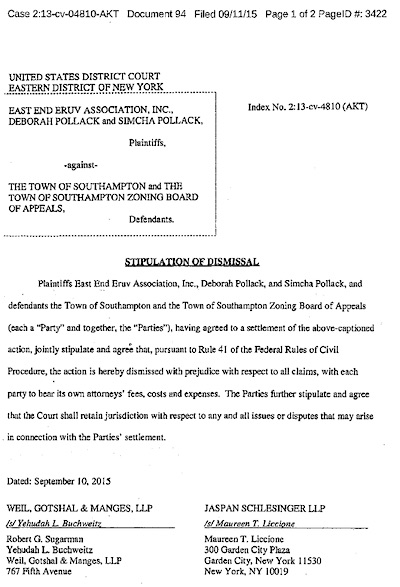 Westhampton Beach’s proposed acceptance of a deal with the East End Eruv Assn. to allow an eruv Jewish religious boundary is probably similar to a deal signed by Southampton last year. WHB is withholding terms of the contract from the public and press.
Westhampton Beach’s proposed acceptance of a deal with the East End Eruv Assn. to allow an eruv Jewish religious boundary is probably similar to a deal signed by Southampton last year. WHB is withholding terms of the contract from the public and press.
The WHB board has scheduled a vote on the agreement at its June 2 meeting. The annual election of the board is June 17.
A copy of the agreement with SH has been obtained in which SH agrees that the lechi markers attached to utility poles are “not signs” and that the “erection of the eruv is not an unconstitutional establishment of religion under the First Amendment.”
Opponents of eruvim, which include about 95% of WHB residents according to previous Mayor Conrad Teller, say both statements are false.
Lechis cannot only be seen by someone who looks closely at utility poles, but the eruv of the Hampton Synagogue in WHB is depicted in color and detail on the Synagogue’s website as are eruvim throughout the U.S.
Residents say it’s common sense that placing religious symbols permanently on utility poles is a violation of the First Amendment and cite legal opinions by law professors Alexandra Susman of UCLA Law School and Marci Hamilton of Yeshiva University that support that view.
Indicating the sentiment of WHB residents is that they elected two new trustees last June 19 on the promise they would never sign an agreement allowing an eruv—Brian Tymann and Rob Rubio.
In previous years, four trustees who won election had openly opposed allowing an eruv in WHB—Hank Tucker, Joan Levan, Sue Farrell and Toni-Jo Birk. Their quotes are in a legal filing of the EEEA.
WHB Could not Challenge Verizon, Long Island Power
Under terms in the proposed agreement, WHB could never challenge “Verizon and LIPA’S authority to enter into contracts with EEEA permitting attachment of lechis to utility poles. Defendants likewise agree not to contest or otherwise challenge the June 16, 2014 ruling of the U.S. District Court for the Eastern District of New York, including, without limitation, that the Transportation Corporations Law and the LIPA Act provide sufficient authority for Verizon and LIPA to enter into private contracts for the use of their utility poles, unrelated to the provision of electric or telephone services.”
WHB would also agree “not to adopt any ordinance or resolution prohibiting the attachment, existence, restoration, maintenance, repair or placement of lechis pursuant to EEEA’s licenses with Verizon or LIPA, or Plaintiff’s successor entities or replacement entities and managers.”
Lawyers who have examined the SH agreement say that by signing such an agreement WHB would put itself in very difficult position should a new Council be elected that wanted to remove the eruv.
That would be a very expensive proposition and far more expensive than withholding permission for an eruv, they said.


 Husch Blackwell Strategies has added FleishmanHillard alum Michael Slatin as a principal in its public affairs group.
Husch Blackwell Strategies has added FleishmanHillard alum Michael Slatin as a principal in its public affairs group. Rory Cooper, a veteran Republican operative and policy specialist, has joined Teneo’s Washington office as senior managing director in its strategy & communications practice.
Rory Cooper, a veteran Republican operative and policy specialist, has joined Teneo’s Washington office as senior managing director in its strategy & communications practice. Brian Fallon, who served as national press secretary for Hillary Clinton’s 2016 presidential run, is signing on next month as Vice President’s Kamala Harris’ campaign communications director.
Brian Fallon, who served as national press secretary for Hillary Clinton’s 2016 presidential run, is signing on next month as Vice President’s Kamala Harris’ campaign communications director. TikTok is nothing more than a Chinese propaganda tool that poses “a grave threat to America’s national security and, in particular, impressionable children and young adults,” say two Congressmen who want the platform registered as a foreign agent.
TikTok is nothing more than a Chinese propaganda tool that poses “a grave threat to America’s national security and, in particular, impressionable children and young adults,” say two Congressmen who want the platform registered as a foreign agent.


 Have a comment? Send it to
Have a comment? Send it to 
No comments have been submitted for this story yet.